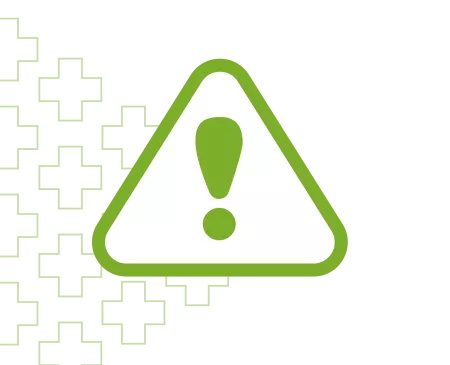Why?
For new healthcare leaders, survey prep can feel like a pressure cooker
Preparing for a regulatory survey is an intense, all-hands-on-deck effort that takes a team of professionals to expertly navigate. And for newer healthcare leaders, this process can seem especially daunting. The pressure of success, combined with the pressure-cooker intensity of today’s healthcare landscape, creates a difficult environment for even the best and brightest.
Further exacerbating these issues, we’re seeing survey-seasoned professionals leave the healthcare field in droves.
Why now?
The “great resignation” means more survey first-timers
During the last two years, we’ve experienced significant turnover in clinical roles. Many leaders have decided to vacate their positions, change jobs or positions within organizations, move into retirement, or even return to the bedside to care for patients directly.
While much regulatory activity was on hold during the pandemic, new vacancies meant that many novice leaders emerged into the field and have yet to interact directly with survey teams in their new roles.
In my position, I often get the chance to support these new leaders as they prepare for survey activity and continuous readiness. Now, as regulatory activity resumes and we again welcome regulatory partners to our campuses, I’ve found that the five focus areas outlined below are often the most helpful in preparing new leaders for surveys. Essentially, they boil down to making sure you know your environment, resources, policies, patients, and limitations.
What?
Know your environment: The “find it, fix it” key to environmental mastery
Knowing your environment means understanding your clinical setting’s physical space and conducting frequent “sweeps” to ensure you are always survey-ready. Many leaders conduct weekly checklists in partnership with key staff members, such as charge nurses or clinical team leaders, to ensure the clinical setting is ready for the next patient and the next surveyor who walks in the door.
Often referred to as a “Find it, Fix it” checklist, this is a universal tool your organization can develop alongside clinical units and members of your regulatory readiness teams. This checklist helps your team standardize scans of the environment, identify frequently cited environmental concerns (e.g., stained ceiling tiles, blocked egress, unsecured medications), and address the problem in real time or create a plan to remedy it soon.
Trust me, the time to discover that you haven’t checked the functionality of your eyewash station in the last eight months is not while accompanying a surveyor on a tour of your clinical work area.
Download our Find It, Fix It Checklist
Know your resources: Help is just a phone call away
Knowing who to call for expertise in your department is often just as important as knowing what to say. New and seasoned leaders alike must know who their “people” resources are during survey so that if (and when) they need to phone a friend, it’s just a natural part of their narrative.
To make sure you’re prepared, identify who among your team best understands:
- Your medical records (including how to navigate)
- How to identify the need for an interpreter
- Visitation policy and standards
- Your “point of use” instrument cleaning process as well as any instrument quality control testing necessary for those point-of-use devices
- The resources available for cleaning equipment (and spills)
- Storage of medical gas cylinders, for example
Knowing who and where your resources are enables you to honestly respond to regulator questions. Instead of “I’m not sure,” you’ll be prepared to say, “I can check with [name] in our [department] and get right back to you.”
Additionally, ask yourself who is comfortable speaking with regulators and who would benefit from additional practice.
Know your policies and practices: Knowledge builds confidence
It’s never a waste of time for new managers to shadow their clinical team members. It’s actually a huge benefit, giving them a fundamental understanding of the nuances and practices of their clinical care delivery. After all, the manager should truly act as the CEO of their own clinical unit, taking full ownership, leadership, and stewardship of their areas of responsibility.
Just as important as understanding how things are done, managers should understand the expectations and compliance surrounding clinical policies, procedures, and standards of care. At a minimum, new managers should firmly understand these policies and procedures to build their toolkit of regulatory preparedness:
- Interpretive Services
- Infection Prevention
- Medication Administration
- Blood Product Administration
- Pain Management
- Assessment/Reassessment
- Restraint Management
- Suicide Prevention
- Consent
- Specialty Oversight (e.g., EMTALA, High-Level Disinfection, etc.)
New leaders should build their knowledge of clinical practices and policies so they are prepared to answer questions confidently and clearly. Rather than using statements like, “Sometimes we…” or “We might do…,” speak in defined terms such as “Yes, this is how we do it,” or “No, we don’t do that.” You could also say, “Our policies state that….”
As long as you know your policies, you should be able to answer definitively and consistently.
Know your patients: Working knowledge makes everything work smoothly
Surveyors are frequently looking to trace patients and records that relate to specific regulatory requirements. For example, surveyors might be looking at categories like patients who are receiving blood products or patients in both violent and non-violent restraints, patients with wounds, those receiving pain management medications, patients who are on titratable medications, and the list goes on.
Managers who have good working knowledge of recent and current patients under their purview often gain the advantage of coordinating a more predictable and efficient survey. In addition, if a surveyor gives the leader or nurse an opportunity to steer them to a patient for record review, having a few charts at the ready—including excellent examples of compliant documentation—is a welcome surprise.
Sometimes surveyors also stop in and speak to patients and their families briefly. While you can’t direct surveyors to specific patients, you should consider circumstances in which it would be inappropriate for a surveyor to conduct an interview—end-of-life situations, patients recovering from anesthesia, or patients having a bedside procedure, to name a few.
Know what you don’t know: Take a deep breath, you’re not alone
It’s simply impossible to know it all. And believe it or not, regulators are people too. They understand that even the most tenured and seasoned leaders lean on others for expertise and experience to mutually benefit the patients and the organization.
Finally, relax. Take a few deep breaths and simply be kind, welcoming, and honest. Treat the surveyors as you would any guest in your home. Keep your conversations professional and specific to the questions asked. Be sure to ask for clarification if you do not understand something and, remember, you can always use resources available to you, such as intranet policies, department resources, and your fellow leaders.
Impact?
Survey success paves the way for organizational well-being
As a new wave of healthcare leaders takes the stage, understanding and adequately preparing for regulatory surveys will equip the next generation for success—not just during survey, but across your organization…patients, team members, and broader communities alike.
Takeaways
Five focus areas for better survey results
Bottom line, if you want better survey results, or this is your first time going through the survey process, the five focus areas detailed above will set you up for success.
And remember, as Benjamin Franklin said, “Failing to prepare is preparing to fail,” so invest in your own readiness for whenever the next regulators show up at the front door.
Chartis Clinical Quality Solutions works with clients all over the country in all types of organizations to conduct regulatory readiness rehearsals. These generally take the form of a mock survey with the added benefit of real-time coaching and feedback plus a comprehensive report with implementable recommendations and sustainable solutions for any out-of-compliance findings. Learn more about Survey Success.
© 2024 Greeley. All rights reserved. This content draws on the research and experience of Chartis consultants and other sources. It is for general information purposes only and should not be used as a substitute for consultation with professional advisors. It does not constitute legal advice.

Receive a CMS Adverse Action Notice? We can help!
If you need immediate assistance responding to regulatory and accreditation activity, please contact us today. Chartis Clinical Quality Solutions brings unmatched expertise helping clients develop Plans of Correction to address threats to accreditation or certification.

